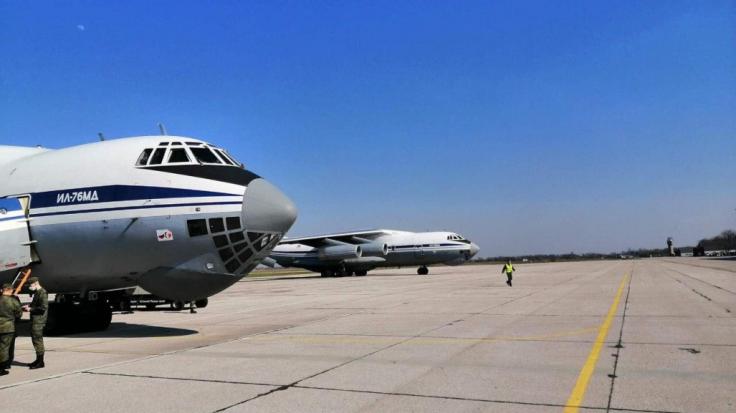Russia’s “rescue” contingents keep storming Europe

The first military cargo aircraft Il-76MD of the Russian Aerospace Forces arrived at the Batajnica air base in Serbia carrying humanitarian aid to fight the coronavirus. In total, Russia plans to deploy at least 11 aircraft with aid, equipment and experts.
Less than in 24 hours since Serbian President Alexander Vučic in a phone conversation with his Russian counterpart Vladimir Putin agreed to accept assistance it was already heading there, that’s as if loaded planes had been waiting on runways awaiting permission to take off.
In fact, it’s the same scenario that is now being implemented in Serbia, under the auspices of the Russian defense ministry rather than the health ministry, as was the case in Italy. But what are the goals of the Russian military in Serbia in the framework of this project, besides stressing in propaganda outlets Russia’s status of a world savior?
First of all, a few words about the Russian contingent, deployed in Serbia. This is 87 military servicemen, 16 units of military equipment, and related supplies. So it’s important to note that the number of “experts” involved in the mission to Serbia with a little over a thousand of COVID-19 cases is actually similar to the Russian team in Italy — the country where more than 100,000 people contracted the novel coronavirus.
Moreover, few noted the fact that the Russian team was deployed to Serbia after North Macedonia joined NATO, while a Russian effort to destabilize Montenegro through religious structures, in particular, the Serbian Orthodox Church, suffered a crushing defeat, so now this country is moving along the path of receiving autocephaly for its local church.

These nuances are very important for understanding the true goals of the Russian “rescue” contingents as a new form of hybrid warfare. After all, the Russians sent their military to Italy not so much to fight the coronavirus, but to solve a huge range of short-term and long-term tasks. In particular, it’s propaganda of Russia’s merciful image with the subsequent attempt to have sanctions eased or lifted, an intelligence operation, recruitment and reconnaissance, and discrediting of the EU, creating preconditions for the campaign on Italy’s withdrawal from the bloc.
In the Balkans, the Russian team could be addressing more ambitious tasks, aimed to further destabilize Montenegro in the religious domain. Moreover, Russian intelligence meddling in 2019 has been repeatedly emphasized and documented in this country. Today, Russian military experts will be able to act officially, while implementing their elaborate psy-ops directly from a strategic bridgehead in Europe’s southern underbelly.
Meanwhile, Russian aid wasn’t able to retain its “humanitarian” brand for too long as the international community is already raising alarm about the Russian army convoys in the very heart of Europe. And one of the first media outlets to call Russians out was Italy’s La Stampa, which noted that 80% of the Russian cargo in their “rescue” batch was unfit to fight the coronavirus. It was precisely this piece by La Stampa that drove Russian military mad. Russia’s senior defense official didn’t even hesitate to threaten the publication’s journalists via the defense ministry’s Facebook page. But it was too late…
The Telegraph in Britain told its readers that Russia had sent “aid” to Italy only to provide a cover-up for the GRU (military intel) operation, Germany’s Bild recalled that Russia conducted a PR campaign in Italy thanks to this country’s ultra-right MP, while French leader Emmanuel Macron openly called Russian assistance to Italy worthless.
Well, Europe seems to have woken up in the media space so it’s unlikely that another Russian IL-76 will land in any other EU member state, but Europe is not only the EU, and this should be borne in mind. The Russian contingent in the Balkans poses no less a threat to the stability of the region and the entire community as a whole than the team in Italy. This mustn’t be ignored — by Montenegro, Northern Macedonia, and other actors, too.
Source: Intercourier
